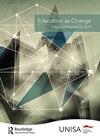Transformation of Higher Learning in South Africa: Perceptions and Understanding of Speech-Language Therapy and Audiology Undergraduate Students
IF 1
4区 教育学
Q3 EDUCATION & EDUCATIONAL RESEARCH
引用次数: 0
Abstract
The professions of speech-language therapy and audiology in South Africa developed under apartheid and historically consisted of and catered to a predominantly white English- or Afrikaans-speaking minority population. Over 25 years into democracy, there continues to be a stark incongruence between the demographic profile of the South African population and the speech-language and hearing (SLH) professions in terms of “race”, linguistic, and cultural diversity, and this has implications for training as well as clinical service provision within the South African context. This article explores undergraduate students’ perceptions and experiences of transformation within South African SLH university training programmes through a cross-sectional descriptive survey research design. A self-developed questionnaire was used to collect data from students enrolled in SLH programmes at South African universities. Thematic analysis identified two themes: 1) progress towards attainment of transformation and, 2) visibility of transformation. These findings highlight the need for diversity through inclusivity, redressing past injustices and incorporating local knowledge into current training and practice. These findings have global relevance for transformation in higher education, not just in the field of SLH. Implications for translation of theory and/or knowledge into practice, with more visible and deliberate application of policy in curriculum reform and institutional culture, are raised.南非高等教育的转型:言语语言治疗与听力学本科生的认知与理解
南非的语言治疗和听力学专业是在种族隔离时期发展起来的,历史上主要是由讲英语或南非荷兰语的少数民族白人组成和服务的。在南非实行民主的25年里,在“种族”、语言和文化多样性方面,南非人口的人口结构与语言和听力(SLH)专业之间仍然存在着明显的不一致,这对南非的培训和临床服务提供产生了影响。本文通过横断面描述性调查研究设计,探讨了南非SLH大学培训项目中本科生对转型的看法和经历。一份自行开发的问卷用于收集南非大学SLH项目的学生的数据。专题分析确定了两个主题:1)实现转型的进展和2)转型的可见性。这些发现强调了通过包容性、纠正过去的不公正以及将当地知识纳入当前的培训和实践来实现多样性的必要性。这些发现对高等教育的转型具有全球相关性,而不仅仅是在SLH领域。提出了将理论和(或)知识转化为实践的影响,在课程改革和体制文化方面更明显和更慎重地应用政策。
本文章由计算机程序翻译,如有差异,请以英文原文为准。
求助全文
约1分钟内获得全文
求助全文
来源期刊

Education As Change
EDUCATION & EDUCATIONAL RESEARCH-
CiteScore
1.40
自引率
0.00%
发文量
29
审稿时长
24 weeks
期刊介绍:
Education as Change is an accredited, peer reviewed scholarly online journal that publishes original articles reflecting critically on issues of equality in education and on the ways in which educational practices contribute to transformation in non-formal, formal and informal contexts. Critique, mainly understood in the tradition of critical pedagogies, is a constructive process which contributes towards a better world. Contributions from and about marginalised communities and from different knowledge traditions are encouraged. The articles could draw on any rigorous research methodology, as well as transdisciplinary approaches. Research of a very specialised or technical nature should be framed within relevant discourses. While specialised kinds of research are encouraged, authors are expected to write for a broader audience of educational researchers and practitioners without losing conceptual and theoretical depth and rigour. All sectors of education are covered in the journal. These include primary, secondary and tertiary education, adult education, worker education, educational policy and teacher education.
 求助内容:
求助内容: 应助结果提醒方式:
应助结果提醒方式:


